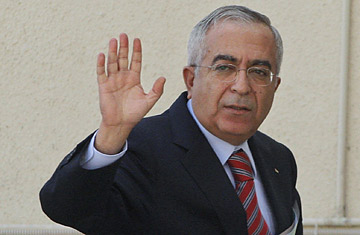
Salam Fayyad waves as he arrives for a meeting of the Palestine Liberation Organization after tendering his resignation to President Mahmoud Abbas in the West Bank city of Ramallah, Saturday, March 7, 2009.
Memo to Secretary of State Hillary Clinton: In the Middle East, a compliment can swiftly become a curse. Clinton may have thought she was boosting Salam Fayyad's credentials by lavishly praising the Palestinian prime minister during her tour of the region last week. However, Fayyad's resignation on Saturday suggests that Washington's support may have sealed the fate of the ex-World Bank official and technocrat who brought a modicum of transparency to the rambunctious affairs of the Palestinian Authority.
The public gloss on Fayyad's departure, set for the end of this month, is that it would pave the way for a new Hamas-Fatah unity government. Talks between the rival Palestinian factions began in earnest on Tuesday in Cairo, and according to Palestinian officials involved in the talks, the Egyptians, at Washington's behest, may be trying to reposition Fayyad for a comeback. It won't be easy; Hamas had long made clear that it did not recognize Fayyad's legitimacy as Prime Minister. Fayyad, a former Finance Minister, was appointed Prime Minister in 2007 of a West Bank-based emergency government by President Mahmoud Abbas, in a bid to outflank Hamas. The Islamists hold a majority in the Palestinian parliament, but many legislators were placed under Israeli arrest, preventing the legislature from sitting. But Hamas wasn't Fayyad's only problem. (See pictures of the recent conflict in Gaza.)
Sources inside the Palestinian Authority claim that the Prime Minister's pat on the head from Clinton was the snapping point for many senior Fatah officials, who resent Fayyad as a technocratic usurper with no political base of his own. Fayyad had spent most of his adult life teaching in the U.S., and returned to the West Bank initially as IMF representative to the Palestinian Authority. He was elected to the Palestinian legislature in 2006 as part of a small Third Way party, and is not a member of President Abbas' Fatah. Many Fatah leaders fault Fayyad, along with Abbas, for being too cozy with Israel and the White House, and for failing to end the occupation of the West Bank despite years of talks with the Israelis.
Fayyad's aloof bank manager style may have impressed foreign governments, but it riled the revolutionary heirs of Yasser Arafat within the Fatah movement, still wedded to the rhetoric of resistance and of martyrdom against Israel, and who have long used money and brawn to secure their own power bases on the ground. Fayyad had challenged their political survival by using his authority over PA funds to wrest control of the many rival security militias (created by Arafat to keep watch on each other) away from Fatah strongmen. Fayyad has been a key player in the U.S-sponsored program to re-train a Palestinian security force that has reasserted government control over the West Bank cities of Nablus, Hebron and Jenin. (See pictures of 60 years of Israel.)
Fayyad's departure may be an early setback for the Obama Administration's plans for the region. One Israeli newspaper even claimed that Secretary Clinton had warned the Palestinians that the U.S. would only work with a Palestinian government headed by Fayyad. The same report, in the leftist daily Haaretz, claimed that the new Secretary of State even believed that Fayyad would make the best candidate to replace Abbas. (Read "What the Middle East Needs from Hillary Clinton.")
Whether or not those specific reports are true, most Palestinians resent what they see as U.S. meddling in their internal politics. The previous Administration had first demanded that the Palestinians hold democratic elections, and then when those elections were won by Hamas, Washington refused to accept the result, and instead set about mustering diplomatic and economic pressure to reverse it. Recent opinion surveys show that Clinton's acclaim for Fayyad and Abbas is not shared by their own people. A poll released this week found that Israel's three-week long offensive in Gaza against Hamas has strengthened political support for the Islamists, and that if a presidential race were held today, Hamas Premier Ismael Haniyeh would defeat Abbas. (See pictures of life under Hamas in Gaza.)
If Fayyad's resignation was intended as a sweetener to Hamas, the Islamists shrugged it off. "Fayyad is America's man in the region, and that's why the Palestinians don't want him," said Mushir al-Masri, a Hamas legislator in Gaza, who stressed that his party would not join any government led by Fayyad. Over in Cairo, meanwhile, unity talks between Hamas and Fatah delegates got off to a rocky start on Tuesday. Hamas demanded that Fatah release "hundreds" of its supporters taken prisoner in the West Bank before it would discuss power sharing. The Egyptian sponsors of the talks urged both parties to reconcile.
According to delegates in Cairo, Egyptian Intelligence Chief Omar Suleiman is pushing for the two factions to agree on a new Palestinian cabinet drawn from outside of both Fatah and Hamas — a government that Suleiman said could "communicate with the world." The implicit message, say insiders, is that Egypt and the U.S. want Fayyad to run the new government. Only by uniting, the Egyptian official said, could Palestinians expect the West to lift the blockade on Gaza, imposed in 2007 when Hamas seized power in the territory and chased out Fatah's armed forces. The new government, he said would also prepare for fresh elections and oversee the reconstruction of Gaza, badly damaged during the recent Israeli assault. "I do not want to remind you of the consequences of, God forbid, failure," Suleiman told the Palestinian delegates. The Egyptians, Americans and the Israelis all want Fayyad to stay on as Prime Minister — everyone, except the Palestinians who count most, the Fatah and Hamas leaders who resent him as a pro-American outsider.
— With reporting by Jamil Hamad / Ramallah
